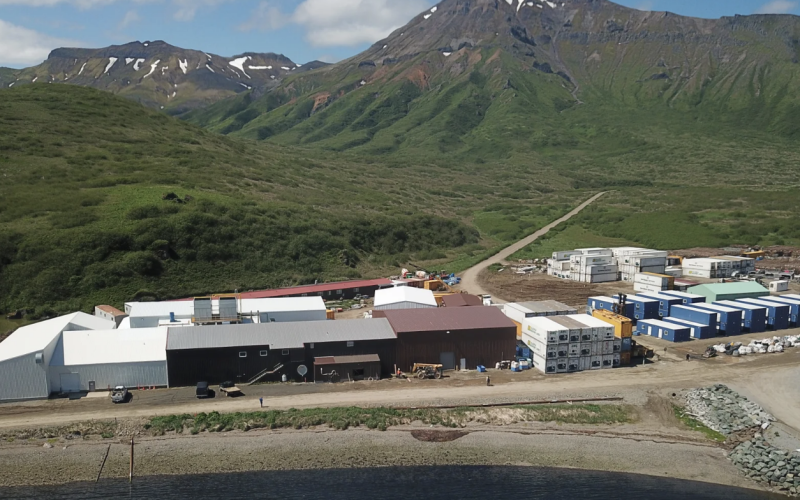Trident Seafoods announced Dec. 12 it plans to sell off a significant portion of its assets in Alaska and to trim its workforce by 10 percent.
The Seattle, Washington-based vertically integrated seafood harvesting and processing firm, which has around 9,000 employees globally, said it will aim to divest itself of its Alaskan assets in Kodiak, Ketchikan, Petersburg, and False Pass, as well as the South Naknek Diamond NN cannery facility and its support facilities in Chignik.
Trident Seafoods CEO Joe Bundrant said the moves were being made to “position the company to fund the reinvestments necessary to continue to lead in the Alaska seafood industry”
"Bold action today is necessary to deliver fair value to fleet, communities, and all stakeholders into the future," Bundrant said.
The moves, under the guise of what the company termed a “comprehensive restructuring initiative,” comes three months after it announced it was delaying the development and construction of a processing plant in Unalaska, Alaska, that was meant to replace an aging plant in Akutan, citing an overall collapse of the seafood market.
Trident said it would likely resume work on the Unalaska plant following the restructuring, as part of a refocus of its Alaska salmon strategy on operations in Southeast Alaska and the Alaska Peninsula and Aleutian Islands, commonly referred to as Area M.
“This move puts the company on a path toward streamlining its Alaska operations and refocusing its global commercial strategy,” the company said. “The restructuring is designed to focus operations and investments on assets that fuel the company’s shift. This includes plans to seek buyers for its diverse operations in Kodiak while operating a significantly scaled-back winter season.”
The Kodiak plants operate nearly year-round and support multiple species, primarily pollock, salmon, Pacific cod, and crab, according to Jeff Welborn, Trident’s senior vice president of Alaska operations.
"Our Kodiak operations are integral to the Gulf of Alaska fisheries," Welbourn said. "They are highly efficient, multispecies plants, and we are working diligently to find a new owner to support the fleet and the Kodiak community."
Trident’s seasonal Ketchikan, Petersburg, False Pass, Naknek cannery, and support plants in Chignik operations “are all well-maintained operations that align better with other operators’ strategies," Welbourn said.
"We are optimistic the combination of new ownership and our continued service to the fleet through our other locations will mean little to no disruption for regional salmon fleets,” he said.
Welbourn said the moves would help Trident update its remaining processing plants in Alaska.
"We are modernizing and retooling the remaining Alaska plants to be more efficient, effective, and sustainable operations," Welbourn said. "This will allow us to continue supporting as many fleets and communities as possible across Alaska for the long term."
In its Dec. 12 announcement, Trident also said it is assessing its overall company-owned vessel strategy. Trident did not offer further clarification.
“This long-term vision underscores Trident’s commitment to operational excellence while adapting to the changing dynamics of the global seafood industry,” it said. “As Trident embarks on this transformational journey, it remains focused on maintaining its world-class quality and safety standards and exploring innovative solutions to meet customer demands.”
Trident said its layoffs would impact 10 percent of its support function headcount working in Seattle.
"Overall, I remain confident in the Alaska seafood industry and our role in it. These are significant changes, and we are focused on treating our impacted employees and communities with the respect and compassion they deserve," Bundrant said. "Embracing these changes and operating a more streamlined company will allow us to reinvest in the communities, people, processes, and assets that enable us to continue our mission of responsibly sharing wild Alaska seafood with the world."
Bundrant said Trident’s strategy “reflects the realities facing U.S. seafood producers in global markets.”
“Across many species, the combination of declining demand, excess supply, and foreign competition has driven prices down, squeezed margins, and displaced U.S. producers from markets that they developed over decades,” he said. "We are competing against producers in other countries that do not share our commitment to or investments in environmental sustainability, social responsibility, and product quality. Many of our foreign competitors operate with minimal regulatory costs and oversight, inexpensive infrastructure, and exploitive labor practices."
A month ago, Bundrant issued a personal public statement warning about trade disparities disadvantaging Alaskan seafood in global markets. He specifically warned that Russian seafood processed in China was entering the U.S. and European markets tariff-free.
“This unfair trade advantage, combined with so little transparency that consumers can’t discern Alaskan from Russian-harvested seafood, puts U.S. seafood producers at a huge disadvantage in U.S. and international markets, compounding already daunting challenges to the long-term competitiveness and viability of U.S. seafood production,” Bundrant wrote.
Bundrant said the company was forced to shift its strategy to reflect this reality.
“In this global business environment, Trident is betting that it can remain competitive by attracting customers who value the sustainability, quality, and integrity of wild Alaska seafood, while also aggressively reducing costs and improving productivity,” he said.
This story originally appeared on SeafoodSource.com and is republished here with permission.







